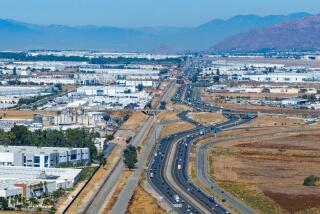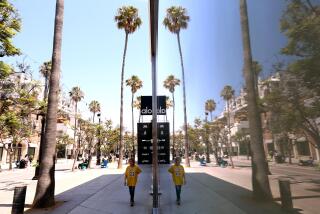Norco, Corona Gear Up to Raise Revenues Through Auto Malls
- Share via
NORCO — Officials in both Norco and Corona are looking to the development of auto malls, much like those in Riverside, Cerritos and Irvine, as a way to attract shoppers and to boost city coffers with increased sales tax revenues.
But many people are questioning whether the two cities--with a combined population of 65,000--can support two separate clusters of auto dealers, even with the rapid population and economic growth forecast for the western end of the Inland Empire.
If they cannot, the cities’ plans for increasing economic activity and tax revenues may become a winner-take-all bout, going to the city that is quickest to come out with a strong combination of location and economic incentives.
“I think the (Corona-Norco) area definitely could sustain one mall,” said Brian Thiebaux, business development specialist for the Riverside County Department of Development. “Two? I don’t know.”
Northwestern Riverside County already boasts the Riverside Auto Center, with more than a dozen car dealers, about seven miles east of Norco and Corona in the City of Riverside, Thiebaux noted. The center is one of the nation’s first auto malls, established by seven dealers in 1965.
‘Very Positive Impact’
The Riverside Auto Center and the nearby Tyler Mall shopping center have been essential to the economic development of the western part of the city, Thiebaux said. “It has generally had a very positive impact. . . . It was really rather ingenious to bring all the auto dealers together.”
An auto mall, with the attraction of “one-stop shopping” and competitive prices, brings increased numbers of customers to all its dealers, said Ralph (Bud) Plender, Norco’s director of community development.
Besides buying more cars, those customers are also likely to spend money on other goods and services in the vicinity of the mall, Plender said.
The Norco Auto Mall would help the city attract “accessory uses,” such as tire stores and specialty repair shops, to the immediate area and “would increase other business opportunities, such as restaurants,” he said.
Norco, which now has no new-car dealers, could stand to gain “approximately $1.5 million or $2 million a year in sales tax revenue,” with 10 or 11 dealerships in its auto mall, Plender estimated.
Triple Sales-Tax Revenue
Even a $1.5-million increase would represent a near-tripling of the sales tax revenue projected for Norco in the current fiscal year, and would boost the city’s total revenue--projected at $7.2 million this year--by 21%.
Increasing tax revenue from commercial sources is essential to Norco, city officials say, because the city consists almost entirely of large residential lots. A residential community cannot generate the funds needed to keep pace with the increasing costs of providing city services, particularly police and fire protection and water service.
But Norco seems to have the jump on its larger neighbor in making its proposed auto mall--and the projected tax bonanza--a reality.
While Corona’s planners are waiting for a consultant’s study of the site they favor, and are considering two other potential sites, Norco already has selected an 88-acre area for its auto mall, has imposed a moratorium on development there and has begun aggressively courting dealers.
Lots Set Aside
The Norco Auto Mall would flank a half-mile stretch of Hamner Avenue, the city’s primary commercial thoroughfare, with additional lots set aside for automotive-related businesses on a cross street. The mall would lie adjacent to Interstate 15 and its 2nd Street exit, which are scheduled to open in 1988, Plender said.
To prevent development that is allowable under current zoning, but could be incompatible with the auto mall, the City Council passed by a 4-1 vote Thursday night a 45-day emergency moratorium on issuing building permits and filing plans and subdivision maps for the area.
The council could extend the moratorium for an additional year, to allow city planners to develop a “specific plan” for the auto mall which would replace the area’s present zoning for commercial and light manufacturing use.
MCR Landscaping, now based in Orange County, is most affected by the development moratorium. The company already has submitted plans to build its 15,000-square-foot headquarters and warehouse on five acres it owns in the proposed auto mall area.
‘Got To Be Flexible
“We had no idea--and I’m not sure they did, either--that they were planning an auto mall there,” said Martin Rippens, a partner in the company. “We bought the property very well knowing what the impact of the freeway would be” on its value.
“It’s not the last spot on earth,” he said. Although “we would like to build a building there . . . I think we’ve got to be flexible. And overall, I think (the auto mall) is good for the city.”
“I think it would be good for the community,” agreed Bill Drake, part owner of the recently opened Norco General Store on Hamner Avenue, “but what it’s going to do for us, I don’t know yet.
“If we had any idea this was going to come about,” he said, “we sure wouldn’t have settled here,” within the proposed auto mall.
Owners of several other small businesses in the area said they cannot afford to move without help from the city. But the manager of a car stereo store said he is “thrilled to death” with the prospect of being surrounded by new-car dealers.
Although the mechanics of matching auto dealers with parcels of land in the mall have not been decided, the city would prefer to encourage private sales than to use its condemnation powers to buy land for resale to the dealers, said Pat Russell, Norco’s associate planner.
“We would hope to develop incentives to avoid making this a massive redevelopment project,” Russell said, but redevelopment funds likely will be available to help homeowners and businesses relocate from the auto mall area.
The city also plans to work with dealers moving into the mall, Plender said, to coordinate its aesthetics, from architectural themes to advertising signs and landscaping on both public and private property in the area.
“We have an excellent site, the full support of the redevelopment agency and the interest of many auto dealers,” Plender boasted.
“We’re not worrying about” whether Corona and Norco area can support two auto malls, he said. “We’re not in competition with any other auto malls, and we’re certainly not in competition with Corona.”
Attract Dealerships
But the city has already begun its effort “to lure auto dealers within the area first, and then lure auto dealerships--possibly new dealerships--to fill in the voids,” Plender said. And the eight dealers closest to Norco all happen to be in Corona.
One of them, Hemborg Ford, is based in the barrio of central Corona. Owner Bob Hemborg plans to move out when his lease expires in two years, he said.
“Norco is spending a lot of its own money” to lure him away from Corona, Hemborg said, including paying for an appraisal of lots he may buy in the auto mall. “They’re putting their project together and selling it like we’d sell cars.”
Corona, on the other hand, has not even decided on a site, Hemborg said.
“Norco has a head start,” conceded George Guayante, deputy director of housing and development in Corona, “but I think that our sites are more desirable.”
All three locations Corona planners are considering lie near the Riverside Freeway, which will carry more traffic than will the north-south interstate freeway, he said.
Increase Car Sales
Corona already receives about $900,000 a year in sales tax from auto dealers, and an auto mall could increase car sales between 40% and 100%, according to dealers’ estimates, Guayante said.
The site now favored by Corona city planners is at the west end of 6th Street, near the Riverside Freeway, where a Toyota dealer and a Chevrolet dealer already stand, he said. “We’re trying to improve the face that Corona presents to the world.”
The needs of auto dealers--high visibility and ready freeway access--complement the desires of city planners to upgrade West 6th Street, Guayante said. “We could kill two birds with one stone.”
Presently, he said, West 6th presents “a jumbled view and no real picture of what Corona is. The view you get is sort of a hodgepodge.”
A West 6th Street auto mall would require a great deal of city involvement, possibly including lengthy condemnation proceedings, because the area is already developed, Guayante said. Two other sites under consideration pose other, substantial problems.
Not Willing to Sell
One site, located north of the Riverside Freeway at Serfas Club Drive, is favored by auto dealers for its superior freeway visibility and access and its proximity to northeastern Orange County, Guayante said, but the site’s owner, the Atchison, Topeka and Santa Fe Railroad, is apparently not willing to sell.
“We are currently trying to talk to Santa Fe,” he said.
The other site under consideration, on the northwest “corner” of the Interstate 15 and Riverside Freeway interchange, has excellent freeway visibility and is available for purchase from Birtcher Pacific Co., Guayante said, but dealers oppose the site because it would have no direct freeway access.
More to Read
Inside the business of entertainment
The Wide Shot brings you news, analysis and insights on everything from streaming wars to production — and what it all means for the future.
You may occasionally receive promotional content from the Los Angeles Times.










